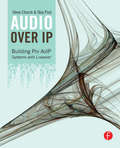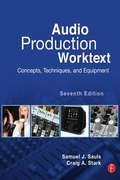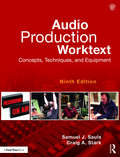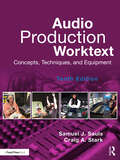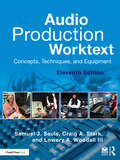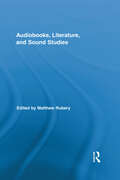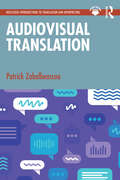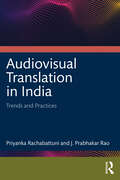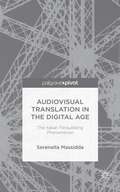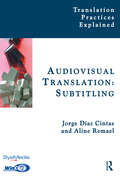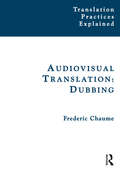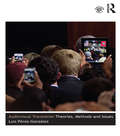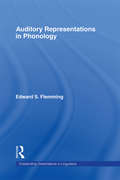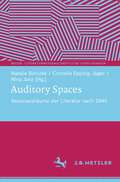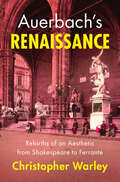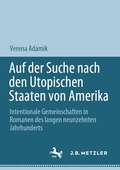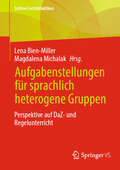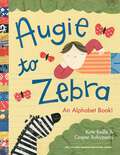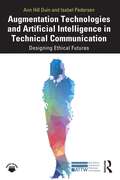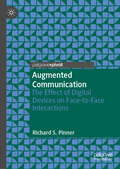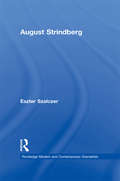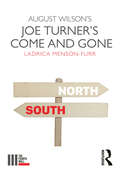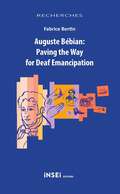- Table View
- List View
Audio Over IP: Building Pro AoIP Systems with Livewire
by Skip Pizzi Steve ChurchPosition yourself at the forefront of audio and broadcast studio technology by learning audio over IP. You will gain knowledge of IP network engineering as it applies to audio applications, and then progress to a full understanding of how equipment built on Ethernet and Internet Protocol are used in today's audio production and broadcast facilities for the transporting, mixing and processing of pro-quality audio. A chapter on integrating Voice-over IP telephony (VoIP) to pro-audio and broadcast facilities is also included. Using the popular Livewire technology, you will learn how to design, construct, configure and troubleshoot an AoIP system, including how to interface with PCs, VoIP telephone PBXs, IP codecs, and the Internet. See how AoIP systems work in practice, and discover their distinct advantages over older audio infrastructures. With its complete introduction to AoIP technology in a fun, highly readable style, this book is essential for audio professionals who want to broaden their knowledge of IP-based studio systems--or for IT experts who need to understand AoIP applications.
Audio Production Worktext
by Craig Stark Sam SaulsProviding insight into the impact media convergence has had on the radio industry, this new edition delivers an excellent introduction to the modern radio production studio, the equipment found in that studio, and the basic techniques needed to accomplish radio production work.New chapters addressing the basics of field recording, production planning, and sound for video are included, as well as a renewed emphasis on not just radio production, but audio production.Featuring a worktext format tailored for both students and teachers, self-study questions, hands-on projects, and a CD with project material, quizzes, and demonstrations of key concepts, this book offers a solid foundation for anyone who wishes to know more about radio/audio equipment and production techniques.
Audio Production Worktext: Concepts, Techniques, and Equipment
by Samuel J. Sauls Craig A. StarkAudio Production Worktext, 9th Edition provides readers the best introduction to audio and radio production. It shows how to navigate modern radio production studios and utilize the latest equipment and software. The 9th edition is updated to cover new mobile technologies, digital consoles, and audio editing apps and software, as well sound for the visual media and Internet radio. The new edition continues to include the worktext/website format tailored for both students and teachers and features like Production Tips that provide notes relevant to various audio production topics, self-study questions and projects, an updated Glossary, and an up-to-date companion website with invaluable student and instructor materials. Included in this edition are offers and features from Pro Sound Effects, FilmTVsound.com, and RadioFX, as well as updated color graphics and images throughout the text.
Audio Production Worktext: Concepts, Techniques, and Equipment
by Samuel J. Sauls Craig A. StarkNow in its tenth edition, the Audio Production Worktext offers a comprehensive introduction to audio production in radio, television, and film. This hands-on, student-friendly text demonstrates how to navigate modern radio production studios and utilize the latest equipment and software. Key chapters address production planning, the use of microphones, audio consoles, and sound production for the visual media. The reader is shown the reality of audio production both within the studio and on location. New to this edition is material covering podcasting, including online storage and distribution. The new edition also includes an updated glossary and appendix on analog and original digital applications, as well as self-study questions and projects that students can use to further enhance their learning. The accompanying instructor website has been refreshed and includes an instructor’s manual and PowerPoint images. This book remains an essential text for audio and media production students seeking a thorough introduction to the field.
Audio Production Worktext: Concepts, Techniques, and Equipment
by Samuel J. Sauls Craig A. Stark Lowery A. Woodall IIINow in its eleventh edition, Audio Production Worktext offers a comprehensive introduction to audio production in radio, podcasting, television, and film.This hands-on, student-friendly text demonstrates how to navigate modern radio production studios and utilize the latest equipment and software. Key chapters address production planning, the use of microphones, audio consoles, and sound production for visual media. The reader is shown the reality of audio production both within the studio and on location. In this new edition, chapters have been reorganized to address the growing prominence of podcasting and digital production. Thorough updates have been made to every chapter, including self-study questions and projects, and the authors continue to draw in diverse and international practitioner perspectives to help translate concepts to real-world practice.This book remains an essential text for audio and media production students seeking a thorough introduction to the field.The accompanying website for students and instructors has also been updated and includes sample syllabi, lesson plans, further study questions, test questions, and web resources, as well as images by chapter as included in the Worktext.
Audiobooks, Literature, and Sound Studies (Routledge Research in Cultural and Media Studies)
by Matthew RuberyThis is the first scholarly work to examine the cultural significance of the "talking book" since the invention of the phonograph in 1877, the earliest machine to enable the reproduction of the human voice. Recent advances in sound technology make this an opportune moment to reflect on the evolution of our reading practices since this remarkable invention. Some questions addressed by the collection include: How does auditory literature adapt printed texts? What skills in close listening are necessary for its reception? What are the social consequences of new listening technologies? In sum, the essays gathered together by this collection explore the extent to which the audiobook enables us not just to hear literature but to hear it in new ways. Bringing together a set of reflections on the enrichments and impoverishments of the reading experience brought about by developments in sound technology, this collection spans the earliest adaptations of printed texts into sound by Charles Dickens, Thomas Hardy, and other novelists from the late nineteenth century to recordings by contemporary figures such as Toni Morrison and Barack Obama at the turn of the twenty-first century. As the voices gathered here suggest, it is time to give a hearing to one of the most talked about new media of the past century.
Audiovisual Translation (Routledge Introductions to Translation and Interpreting)
by Patrick ZabalbeascoaThis accessible textbook introduces the core concepts and issues of translation relevant for the training of audiovisual translators.Structured around different characteristics and problem areas in audiovisual translation (AVT), this text provides the scaffolding for shaping informed, critical thinkers and astute translators. Adopting a theory-driven approach, with short theoretical introductions and clear definitions, the author incorporates challenging issues to encourage readers to find their own answers and opinions. Translation technology is explored where relevant and current online resources will be introduced but discussed in a timeless fashion, without focusing on specific software, so that the thinking can be applied to and reconciled with evolving and future platforms, as well as other modes of translation. Each chapter includes an introduction to concepts and issues, explanations and debate, a wide range of examples and exercises and questions throughout. Written by a leading researcher and practising teacher with experience freelancing in the AVT field, this is the ideal core textbook for students on postgraduate courses in AVT and of interest to both practising translators and students in translation studies, multimodal analysis, languages and film studies.
Audiovisual Translation in India: Trends and Practices
by Priyanka Rachabattuni J. Prabhakar RaoThis book provides a comprehensive introduction to Audiovisual Translation (AVT) in India. It examines the AVT of TV advertisements, analyses trends and practices of AVT in India, and studies the challenges faced by AV translators, including synchronising video with voice/dialogue in advertisements and time and space/text compression for subtitling. The volume studies the interplay of language, culture transfer, and the role of the AV translator in Indian AV advertisement translations and looks at how global advertising impacts local language and culture. It emphasises the role of the translator and explores how the translator devises strategies by considering various elements in an AV medium to achieve equivalence through the translation process. Drawing on case studies, this work will be indispensable to students and researchers of translation studies, media studies, language and linguistics, advertising, film studies, communication studies, and South Asian studies.
Audiovisual Translation in the Digital Age: The Italian Fansubbing Phenomenon
by Serenella MassiddaThis pioneering study on fan translation focuses on Italian fansubbing as a concept, a vibrant cultural and social phenomenon which is described from its inception in 2005 to today. It explores far-reaching issues related to fansubbing and crowdsourcing, highlighting in particular the benefits and drawbacks of Web 2. 0.
Audiovisual Translation, Subtitling (Translation Practices Explained)
by Jorge Díaz-Cintas Aline Remael"Audiovisual Translation: Subtitling" is an introductory textbook which provides a solid overview of the world of subtitling. Based on sound research and first-hand experience in the field, the book focuses on generally accepted practice but identifies current points of contention, takes regional and medium-bound variants into consideration, and traces new developments that may have an influence on the evolution of the profession. The individual chapters cover the rules of good subtitling practice, the linguistic and semiotic dimensions of subtitling, the professional environment, technical considerations, and key concepts and conventions, providing access to the core skills and knowledge needed to subtitle for television, cinema and DVD. Also included are graded exercises covering core skills. "Audiovisual Translation: Subtitling" can be used by teachers and students as a coursebook for the classroom or for self-learning.It is also aimed at translators and other language professionals wishing to expand their sphere of activity.While the working language of the book is English, an accompanying DVD contains sample film material in Dutch, English, French, Italian and Spanish, as well as a range of dialogue lists and a key to some of the exercises. The DVD also includes WinCAPS, SysMedia's professional subtitling preparation software package, used for broadcast television around the world and for many of the latest multinational DVD releases of major Hollywood projects.
Audiovisual Translation: Dubbing (Translation Practices Explained)
by Frederic ChaumeAudiovisual Translation: Dubbing is an introductory textbook that provides a solid overview of the world of dubbing and is fundamentally interactive in approach. Based on first-hand experience in the field, the book combines translation practice with other related tasks – usually commissioned to dialogue writers and dubbing assistants – thus offering a complete introduction to the field of dubbing. It develops diversified skills, presents a broad picture of the industry, engages with the various controversies in the field, and challenges prevailing stereotypes. The individual chapters cover the map of dubbing in the world, the dubbing market and professional environment, text segmentation into takes or loops, lip-syncing, the challenge of emulating oral discourse, the semiotic nature of audiovisual texts, and specific audiovisual translation issues. The book further raises a number of research questions and looks at some of the unresolved challenges of this very specific form of translation. It includes graded exercises covering core skills that can be practised in class or at home, individually or collectively.
Audiovisual Translation: Theories, Methods and Issues
by Luis Perez-GonzalezAudiovisual translation is the fastest growing strand within translation studies. This book addresses the need for more robust theoretical frameworks to investigate emerging text- types, address new methodological challenges (including the compilation, analysis and reproduction of audiovisual data), and understand new discourse communities bound together by the production and consumption of audiovisual texts. In this clear, user- friendly book, Luis Pérez-González introduces and explores the field, presenting and critiquing key concepts, research models and methodological approaches.Features include: • introductory overviews at the beginning of each chapter, outlining aims and relevant connections with other chapters• breakout boxes showcasing key concepts, research case studies or other relevant links to the wider field of translation studies• examples of audiovisual texts in a range of languages with back translation support when required• summaries reinforcing key issues dealt with in each chapter• follow- up questions for further study• core references and suggestions for further reading.• additional online resources on an extensive companion website This will be an essential text for all students studying audiovisual or screen translation at postgraduate or advanced undergraduate level and key reading for all researchers working in the area.
Auditory Representations in Phonology (Outstanding Dissertations in Linguistics)
by Edward S. FlemmingThis book provides evidence for the importance of auditory properties of speech sounds in phonology.
Auditory Spaces: Resonanzräume der Literatur nach 1945 (Media. Literaturwissenschaftliche Forschungen)
by Cornelia Epping-Jäger Natalie Binczek Nina JanzMit dem Begriff der Auditory Spaces werden unterschiedliche Aspekte und Erscheinungsformen der vielschichtigen Hörräume der Literatur gebündelt, die sowohl präsentische Angesichtigkeit der Akteure in ihren jeweiligen Umgebungen als auch mediale Transformationen ermöglichen. In den beiden Nachkriegsdekaden und darüber hinaus operierte die Literatur vor allem als stimmliche Verlautbarung von Texten in verschiedenen Formaten, Konstellationen und Resonanzräumen. Die Beiträge des Bandes nähern sich der Frage, wie und in welchen Formen Stimme, mündliche Performativität und die Reflexion der auditiven Dimension einer Mitteilung maßgeblich dazu beitrugen, das literarische Feld in den Jahren nach 1945 neu zu konstituieren und poetologisch zu reformieren.
Auerbach's Renaissance: Rebirths of an Aesthetic from Shakespeare to Ferrante
by Chris WarleyErich Auerbach's Mimesis is among the most admired works of literary criticism of the last hundred years. Amidst the horrors of the Second World War, Auerbach's prodigious learning managed – almost miraculously – to give voice to a delicate, subtle optimism. Focusing on Auerbach's account of Renaissance literature, Christopher Warley rediscovers the powerful beauty of Mimesis and shows its vitality for contemporary literary criticism. Analysing Auerbach's account of Renaissance love lyric alongside Woolf's To the Lighthouse, fifteenth-century Burgundian writing alongside Ferrante, and Shakespeare alongside Michelet, Ruskin and Burckhardt, Auerbach's Renaissance traces an aesthetic that celebrates the diversity of human life. Simultaneously it locates in Auerbach's reading of Renaissance writing a challenge to the pessimism of today, the sense that we live in an endless present where the future looms only as a threat. Auerbach's scholarship, the art he learns from Dante, Rabelais, Montaigne, and Shakespeare, is a Renaissance offering democratic possibility.
Auf der Suche nach den Utopischen Staaten von Amerika: Intentionale Gemeinschaften in Romanen des langen neunzehnten Jahrhunderts
by Verena AdamikIn diesem Buch wird versucht, die scheinbar direkte Verbindung zwischen Utopismus und den USA zu verstehen, indem Romane besprochen werden, die in dieser Kombination noch nie zusammengebracht wurden, obwohl sie sich alle um intentionale Gemeinschaften drehen: Imlays The Emigrants (1793), Hawthornes The Blithedale Romance (1852), Howlands Papas Own Girl (1874), Griggs' Imperium in Imperio (1899), und Du Bois' The Quest of the Silver Fleece (1911). Sie setzen Nation und Utopie nicht in Beziehung, indem sie perfekte Gesellschaften beschreiben, sondern indem sie über Versuche schreiben, unmittelbar ein radikal anderes Leben zu führen. Indem die Lektüre die jeweilige kommunale Geschichte aufzeigt, bietet sie eine literarische Perspektive für kommunale Studien und trägt zu einer dringend notwendigen Historisierung für rein literarische Ansätze zum US-Utopismus und für Studien bei, die sich auf Pilgrims/Puritans/Gründerväter als utopische Praxis konzentrieren. Das Buch zeigt daher auf, wie die Autoren das utopische Potenzial der USA bewerteten, und zeichnet die Entwicklung der utopischen Vorstellungskraft im neunzehnten Jahrhundert aus verschiedenen Perspektiven nach.
Aufgabenstellungen für sprachlich heterogene Gruppen: Perspektive auf DaZ- und Regelunterricht (Edition Fachdidaktiken)
by Lena Bien-Miller Magdalena MichalakIm Fokus des Sammelbands steht die Frage, wie Aufgabenstellungen im Deutsch-, DaZ- und Fachunterricht sprachbewusst ausgestaltetet werden können, um auf Seiten der Lernenden die schnelle Verfügbarkeit und den Einsatz angemessener sprachlicher Mittel bei anspruchsvolleren kognitiven Aktivitäten zu sichern und zugleich ihre mehrsprachigen und plurikulturellen Ressourcen zu nutzen. Damit spiegelt der Band die aktuelle Debatte zum Einsatz von sprachbildenden Aufgabenstellungen und zu Praktiken des Übens in der Didaktik des Deutschen als Erst- und Zweitsprache an der Schnittstelle zu anderen Fachdidaktiken und mit Blick auf die Heterogenität der Lernenden wider.
Augie to Zebra: An Alphabet Book!
by Caspar Babypants"Eliza educates elephants. Manny mimics monkeys. Sisika sings with sparrows." Each letter of the alphabet gets its own alliterative sentence involving a name, an activity, and an animal. This fresh approach to the ABCs is coupled with Kate Endle's charming and colorful collage art. Kate Endle is a collector of beautiful and unusual printed papers, and she uses them to compose vibrant images for children's books and original artwork. This enhanced ebook features Caspar Babypants singing the song of Augie to Zebra as the words are highlighted, with automatic page turns. Of course, this beautiful ebook can be read the old-fashioned way as well.
Augie to Zebra: An Alphabet Book!
by Caspar Babypants"Eliza educates elephants. Manny mimics monkeys. Sisika sings with sparrows." Each letter of the alphabet gets its own alliterative sentence involving a name, an activity, and an animal. This fresh approach to the ABCs is coupled with Kate Endle's charming and colorful collage art. Kate Endle is a collector of beautiful and unusual printed papers, and she uses them to compose vibrant images for children's books and original artwork--which makes her books completely unique and immediately recognizable by a growing following. Readers can also download a free MP3 song of the text performed by Caspar Babypants, who is a popular performer and recording artist in the world of children's music (as well as lead singer of the Presidents of the United States).
Augmentation Technologies and Artificial Intelligence in Technical Communication: Designing Ethical Futures (ATTW Series in Technical and Professional Communication)
by Ann Hill Duin Isabel PedersenThis book enables readers to interrogate the technical, rhetorical, theoretical, and socio-ethical challenges and opportunities involved in the development and adoption of augmentation technologies and artificial intelligence. The core of our human experience and identity is forever affected by the rise of augmentation technologies that enhance human capability or productivity. These technologies can add cognitive, physical, sensory, and emotional enhancements to the body or environment. This book demonstrates the benefits, risks, and relevance of emerging augmentation technologies such as brain–computer interaction devices for cognitive enhancement; robots marketed to improve human social interaction; wearables that extend human senses, augment creative abilities, or overcome physical limitations; implantables that amplify intelligence or memory; and devices, AI generators, or algorithms for emotional augmentation. It allows scholars and professionals to understand the impact of these technologies, improve digital and AI literacy, and practice new methods for their design and adoption. This book will be vital reading for students, scholars, and professionals in fields including technical communication, UX design, computer science, human factors, information technology, sociology of technology, and ethics. Artifacts and supplemental resources for research and teaching can be found at https://fabricofdigitallife.com and www.routledge.com/9781032263755.
Augmented Communication: The Effect Of Digital Devices On Face-to-face Interactions
by Richard S. PinnerThis book explores the ways in which handheld networked devices can be used to enhance and augment interpersonal communication. The author examines in depth how the addition of visual and multimodal input, access to online search engines and the inclusion of participants from distant geographical locations (either synchronously or asynchronously) affects our face to face interactions. Presenting research data from several years of autoethnographic observation, this balanced work reveals the consequences, both positive and negative, of technology-dependent forms of discourse. In doing so, this sociolinguistic perspective fills a gap in the current literature and indicates possible future directions for the study of augmented communication. It will appeal in particular to students and scholars of sociolinguistics, applied linguistics and digital humanities.
August Na (The Ninth of August)
by Manoranjan Das Arun Kumar Mohanty Jatindra Kumar NayakThe Ninth of August: An English translation by Arun Kumar Mohanty and Jatindra Kumar Nayak of Manoranjan Das's original Oriya play August Na. Sahitya Akademi, New Delhi (2005).
August Strindberg (Routledge Modern and Contemporary Dramatists)
by Eszter SzalczerDramatist, theatre practitioner, novelist, and painter, August Strindberg’s diverse dramatic output embodied the modernist sensibility. He was above all one of the most radical innovators of Western theatre. This book provides an insightful assessment of Strindberg’s vital contribution to the dramatic arts, while placing his creative process and experimental approach within a wider cultural context. Eszter Szalczer explores Strindberg’s re-definition of drama as a fluid, constantly evolving form that profoundly influenced playwriting and theatrical production from the German Expressionists to the Theatre of the Absurd. Key productions of Strindberg’s plays are analysed, examining his theatre as a living voice that continues to challenge audiences, critics, and even the most innovative directors. August Strindberg provides an essential and accessible guide to the playwright’s work and illustrates the influence of his drama on our understanding of contemporary theatre.
August Wilson's Joe Turner's Come and Gone (The Fourth Wall)
by Ladrica Menson-Furr"Herald Loomis, you shining! You shining like new money!" - Bynum Walker August Wilson considered Joe Turner’s Come and Gone (1984) to be his favourite play of the ten in his award-winning Pittsburgh Cycle. It is a drama that truly examines the roots, crossroads, and intersections of African, American, and African American culture. Its characters and choral griots interweave the intricate tropes of migration from the south to the north, the effects of slavery, black feminism and masculinity, and Wilson's theme of finding one's "song" or identity. This book gives readers an overview of the work from its inception on through its revisions and stagings in regional theatres and on Broadway, exploring its use of African American vernacular genres—blues music, folk songs, folk tales, and dance—and nineteenth-century southern post-Reconstruction history. Ladrica Menson-Furr presents Joe Turner's Come and Gone as a historical drama, a blues drama, an American drama, a Great Migration drama, and the finest example of Wilson's gift for relocating the African American experience in urban southern cities at the beginning and not the end of the African American experience.
Auguste Bébian: Paving the Way for Deaf Emancipation
by Fabrice BertinPublished in French and English by INSEI Editions, Suresnes, France. English edition distributed throughout the world by Gallaudet University Press. To some, he is a mythical figure; to others, he is unknown. Auguste Bébian (1789-1839) reflects society’s ambivalence toward Deaf history: sometimes recognized, often ignored. In the wake of Abbé de l’Épée, whose name is remembered in posterity and who demonstrated that the large-scale education of Deaf people was possible, Auguste Bébian was nonetheless a key player in an unprecedented upheaval, which in many ways went beyond the educational sphere. The goal of this research on Auguste Bébian, combining biographical elements and analysis of his thinking in unprecedented ways, is not to deconstruct the myth, but rather to decipher the messages it conveys, and to understand what it tells us, indirectly, about the Deaf experience. Born in 1789 in Guadeloupe, part of the French West Indies, it was on the other side of the Atlantic Ocean, in France, that Auguste Bébian fulfilled most of his destiny. While living at the National Institution for the Deaf in Paris at the beginning of the 19th century, his daily contact with the young students made him the first known hearing person in France to achieve true mastery of sign language, the natural language of Deaf people, and a deep understanding of its inherent culture. On becoming a teacher, he constantly defended the use of sign language as a linguistic system in its own right in order to awaken the intelligence of Deaf children, to whom “we pay no more attention than to the sunlight that shines on us every day.” His numerous publications display a level of modernity rarely seen before or since. This biographical and historical study shows how the passion evinced by Auguste Bébian was a crucial link in the chain of events that led to the emancipation of Deaf people.
